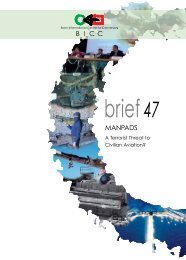egypt-final-presidential-elections-2012
egypt-final-presidential-elections-2012
egypt-final-presidential-elections-2012
You also want an ePaper? Increase the reach of your titles
YUMPU automatically turns print PDFs into web optimized ePapers that Google loves.
The Carter Center<br />
Presidential Election in Egypt<br />
without possibility of appeal to a court or other<br />
entity. During the electoral process, many<br />
Egyptians expressed concerns about the exclusive<br />
authority that the PEC possessed to decide<br />
certain election-related matters. In barring any<br />
possibility of appeal, even, for example, in cases<br />
that could violate Egyptian citizens’ fundamental<br />
right to vote or to equal suffrage, Article 28 of<br />
the Constitutional Declaration is inconsistent<br />
with Egypt’s international obligations. The Carter<br />
Center recommends that lawmakers ensure that<br />
there is an opportunity to appeal to an impartial<br />
tribunal from any decisions taken by any election<br />
management body.<br />
4. Advance equal representation of women in<br />
public affairs and in electoral administration.<br />
Women remain underrepresented in decisionmaking<br />
bodies in Egypt. There was only one<br />
female judge serving on the PEC secretariat and<br />
no female judges serving at the commissioner<br />
level due to the ex officio nature of appointing<br />
judges to the EMB and the absence of women at<br />
the most senior levels of the judiciary. Therefore,<br />
The Carter Center encourages authorities to take<br />
concrete steps to include women in leadership<br />
positions and hopes that women will become<br />
a greater — and more senior — component of<br />
Egypt’s judiciary in the years to come. The Carter<br />
Center also encourages Egyptian authorities and<br />
future EMBs to do more to ensure that female poll<br />
workers are represented in every polling station<br />
and in leadership positions at all levels of electoral<br />
administration.<br />
5. Ensure the enjoyment of the fundamental rights<br />
to vote and to be elected.<br />
Under the current legal framework, a number of<br />
categories of Egyptian citizens are prohibited from<br />
voting. They include those who turn 18 between<br />
the date of closure of the voters’ list and election<br />
day, people who have been declared bankrupt<br />
in the last five years, Egyptians without national<br />
identification cards, members of the military, and<br />
others. The Carter Center suggests that lawmakers<br />
reconsider these legal provisions to ensure that<br />
voting rights are enjoyed by the widest possible<br />
pool of eligible voters.<br />
While women appeared to vote in considerable<br />
numbers, recent studies indicate that as many as<br />
3 million women of eligible voting age are not<br />
registered to vote because they do not possess the<br />
necessary national identification cards. The Carter<br />
Center urges the government of Egypt and others<br />
to ensure that women are not prevented from<br />
participating in public affairs by the technical<br />
barriers imposed by the national identification<br />
system and take proactive steps to ensure all<br />
eligible voters have access to the documentation<br />
necessary to register.<br />
Regarding candidate eligibility, The Carter<br />
Center recommends that lawmakers and the<br />
courts review the procedures for expunging<br />
criminal records, including rehabilitating the<br />
legal status of Egyptians convicted of crimes who<br />
wish to run for political office. This is particularly<br />
pertinent for Egyptians who may have received<br />
politically motivated convictions under the<br />
previous government so that they may regain<br />
their eligibility as expeditiously as possible. The<br />
Carter Center also encourages Egyptian leaders to<br />
reconsider prohibition against running for president<br />
for those Egyptians whose parents have ever<br />
held non-Egyptian nationality or whose spouse<br />
is a non-Egyptian. The candidate runs for office;<br />
not his or her family. Therefore, he or she should<br />
not be denied this important right because of the<br />
nationality of others.<br />
6a. Ensure that the electoral legal framework is the<br />
product of a transparent, consultative process.<br />
Prior to the election of the legislative People’s<br />
Assembly in 2011, amendments to key electoral<br />
laws were issued by the unelected SCAF without<br />
public consultation or any meaningful transparency.<br />
The Carter Center recommends that future<br />
iterations of the legal framework for <strong>elections</strong> be<br />
68



